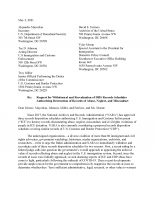- Letters
Council and Broad Coalition Urge Department of Homeland Security to Withdraw Records Destruction Plans
Published
Immigration enforcement agencies—U.S. Immigration and Customs Enforcement (ICE) and U.S. Customs and Border Protection (CBP)—plan to destroy important records that document a range of serious issues. Records destruction schedules approved by the National Archives and Records Administration (NARA) allow ICE and CBP to permanently destroy records documenting abuse, neglect, misconduct, and civil rights violations of people in detention.
The American Immigration Council and a large, diverse coalition of organizations urge NARA and the Department of Homeland Security (DHS) to withdraw and review the records destruction schedules. The letter cites recent scrutiny of how DHS determines which records are worthy of preservation as well as alarming evidence of ICE and CBP abuse, especially amidst the COVID-19 pandemic.
The lack of accountability for ICE and CBP abuse and misconduct is well established. Destroying documentation of such conduct would further hinder accountability and oversight at DHS. The records should be preserved, and future records destruction decisions must meaningfully involve the public.
Help us fight for immigration justice!
The research is clear – immigrants are more likely to win their cases with a lawyer by their side. But very few can get attorneys.
Introducing the Immigration Justice Campaign Access Fund.
Your support sends attorneys, provides interpreters, and delivers justice.

Immigration Justice Campaign is an initiative of American Immigration Council and American Immigration Lawyers Association. The mission is to increase free legal services for immigrants navigating our complicated immigration system and leverage the voices and experiences of those most directly impacted by our country’s immigration policies to inform legal and advocacy strategies. We bring together a broad network of volunteers who provide legal assistance and advocate for due process for immigrants with a humane approach that includes universal legal representation and other community-based support for individuals during their immigration cases.

